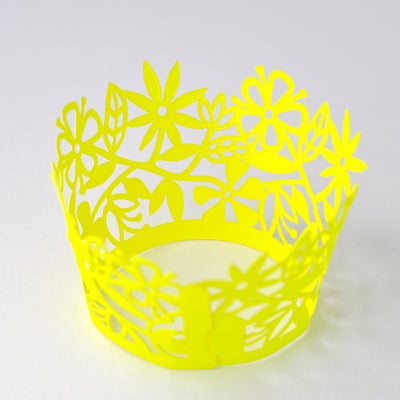What are natural sprinkles made from?
On the back of each sprinkle pack is a list of all the natural ingredients used in our sprinkles, but do you know what they mean?
Sugar - this is the main ingredient found in our sprinkles. Rest assured that the sugar used is suitable for vegans (does not contain bone char).
Potato Starch - is the starch found in potatoes. It comes from a multistep process where the potatoes are crushed to allow the starch grains to release from the destroyed cells. The starch is then washed out and dried to powder. Potato starch is commonly used as a thickener for stews, sauces and puddings.
Corn Starch - is a starch extracted from corn kernels. The outer bran and germ are removed leaving the starch-rich endosperm behind. Corn starch is a common thickening agent perfect for thickening sauces, stews and puddings.
Vegetable Fats - If palm oil is used in our sprinkles it is RSPO oil, however, we are phasing the use of palm oil out completely. Coconut and olive oils are used as alternatives.
Coconut Oil - extracted from the meat of matured coconuts harvested from coconut trees.
RSPO Palm - ‘Roundtable on Sustainable Palm Oil’ - https://rspo.org/,
Olive Oil - extracted from olives
Rice Flour - is made from finely milled rice to create a flour. Rice flour inhibits liquid separation so is often used as a thickening agent in recipes that are refrigerated or frozen.
Potassium Aluminium Silicate - E555 (Anti-caking agent) - Produced from several natural minerals
Maltodextrin - is a water-soluble, neutral tasting white powder closely related to corn syrup solids, which the one difference being their sugar content. Maltodextrin is made from corn, rice or potato starch.
Gum Arabic (Stabilizer) - is a fibrous product made from the natural hardened sap of two types of wild Acacia tree.
Carnauba Wax - E903 (Glazing agent) - Carnauba wax is a vegetable wax obtained from the leaves of a Brazilian palm tree (Copernica cerifera) known as the “Tree of Life.”
Sunflower Lecithin (Emulsifier) - is a fatty substance that is extracted from sunflower seeds. Sunflower lecithin is never genetically modified and is considered better for you that other lecithins as it the extraction process doesn’t require the use of chemicals.
Hypromellose - E464 - is an emulsifier, thickening and suspending agent. It is used as an alternativel to animal gelatine.
Propylene Glycol - is a synthetic, colourless, odourless, slightly syrupy liquid that is used as a food additive to prevent components from stick to one another and forming clumps.
Our sprinkles are coloured using natural ingredients, most of which have an E number.
‘E’ stands for Europe, and the E number code relates to a set of EU rules about which foods can contain them and how much you should be able to consume in a day. Natural substances like vitamin C (E300), paprika (E160c) and even oxygen (E948) each have an E Number assigned to them, along with many other naturally occurring substances.
E100 Turmeric/Curcumin - A natural colour which comes from the Turmeric plant root. Curcumin is currently being investigated for its potential health benefits in diseases such as Alzheimer’s disease, cancer, allergies and arthritis.
E153 Vegetable Carbon - A natural colour created by burning vegetable matter.
E160c Paprika - A natural colour extracted from the fruit pod and seeds of the red pepper.
E162 Beetroot Red - A natural colour produced from beets.
E163 Anthocyanins - A natural colour extracted from grape skins or red cabbage using water, methanol or ethanol. E163 is a naturally occurring antioxidant and therefore it has health benefits.
E171 Titanium Dioxide - A natural colour extracted from the mineral Ilmenite.
Spirulina Extract - is a type of cyanobacteria, a family of single-celled microbes more commonly referred to as blue-green algae. Spirulina is an excellent dietary supplement for vegetarians and vegans as it has a high protein and vitamin content.
Sources:
https://draxe.com/potato-starch/
https://en.wikipedia.org/wiki/Potato_starch
https://www.healthline.com/nutrition/substitutes-for-cornstarch
https://www.bbcgoodfood.com/howto/guide/health-benefits-coconut-oil
https://www.oliveoiltimes.com/olive-oil
https://en.wikipedia.org/wiki/Rice_flour
http://www.food-info.net/uk/e/e555.htm
https://www.healthline.com/health/food-nutrition/is-maltodextrin-bad-for-me#is-it-safe
https://www.mountainroseherbs.com/products/carnauba-wax/profile
https://draxe.com/sunflower-lecithin/
https://en.wikipedia.org/wiki/Hypromellose
https://www.healthline.com/nutrition/propylene-glycol#section1
http://www.exploreenumbers.co.uk/top-10-e-numbers-try-avoid.html
https://www.safefood.eu/Food-Colour-Resource/Food-colour-index/Name-and-E-number.aspx
https://www.medicalnewstoday.com/articles/324027.php
https://www.healthline.com/nutrition/10-proven-benefits-of-spirulina#section1





